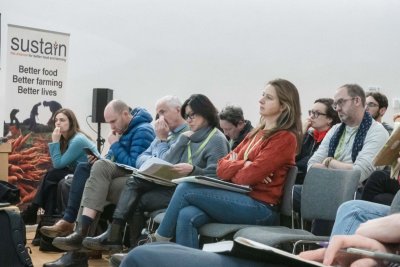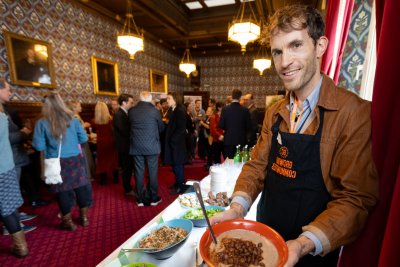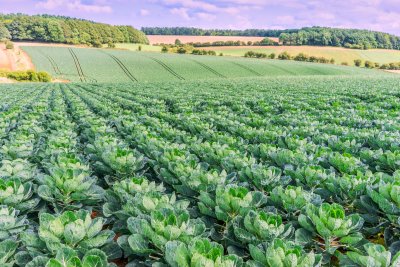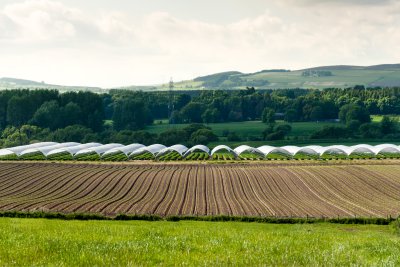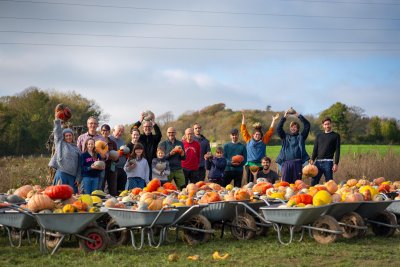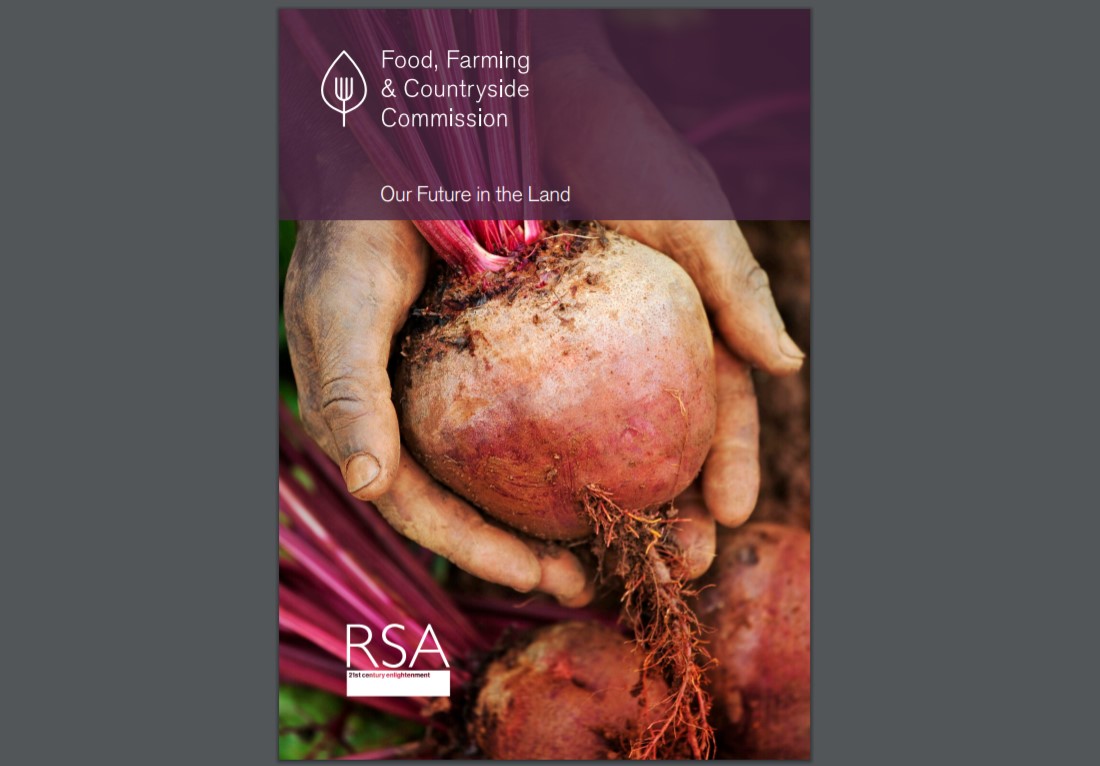

UK must transition to sustainable food and farming system by 2030, leading Commission warns
The UK must completely transition to a sustainable post-Brexit food system by 2030 or face further climate breakdown and the continued rise in diet-related ill-health, according to the final report of a major Commission led by one of the UK’s leading business figures.
- Independent RSA Commission, led by Barclay UK’s chair, calls for a radical 10-year plan to transition to sustainable food system with more government support for healthy produce.
- Government must act now embed this vision into a coordinated rural policy which puts the countryside at the centre of the green economy, including a new ‘National Nature Service’ to connect young people who care about climate breakdown with the ‘restoration economy’.
- Environment Secretary Michael Gove addresses launch alongside Henry Dimbleby, newly appointed to develop a National Food Strategy.
Our Future in the Land by the RSA Food, Farming and Countryside Commission and chaired by Barclay’s UK chair Sir Ian Cheshire alongside senior figures from across industry, sets out a blueprint for the UK’s food, farming and countryside system as the UK is set to leave the European Union.
The final report Our Future in the Land, executive summary and Field Guide to the Future are available to download here: https://www.thersa.org/action-and-research/rsa-projects/public-services-and-communities-folder/food-farming-and-countryside-commission
The UK risks further “deforestation, loss of wildlife, soil degradation, widespread pollution and rocketing diet-related ill-health”, the analysis warns, adding that “instead of being the sector that nourishes people, and the land on which we all depend, it has damaged and depleted our precious and finite resources”.
The two-year independent inquiry, sponsored by the Esmée Fairbairn Foundation and based on extensive consultation of all players in the food and farming system, found that most farmers agreed they could make big changes to the way they farm in five to ten years – with the right backing.
The report proposes an ambitious ten-year transition plan to sustainable agro-ecological farming by 2030, warning that the UK today ranks just 24th in the Economist Intelligence Unit’s global Food Sustainability Index.
Agroecology means farming in ways that learn from, work with and enhance natural and social systems. Organic farming, integrated pest management, pasture-fed livestock, conservation and regenerative agriculture, and agroforestry are all examples.
Without stable policy, regulation, advice and access to relevant finance and innovation farmers will remain locked into current business practices, the Commissioners warn.
The study also calls for:
- The government to stop delays on policy and trade decisions and commit to a futureproof ambition and the essential elements of a transition plan by January 2020. It makes the case for agro-ecology based on UK modelling of the EAT-Lancet report, which considered a wider set of impacts including nature-friendly farming, animal welfare, chemicals and antibiotic use, and the climate impact of imported feedstuffs for intensively-reared pigs and poultry.
- More healthy British produce, particularly fruit, veg, nuts and pulses, and meat and dairy from ‘sustainable livestock’. We need to ramp up the commitments by public bodies to buy more sustainably produced British and local produce for schools, hospitals and prisons and to use it more widely and imaginatively in meals. UK and international evidence show this works – it needs backing to roll out. Retailers and processors can do more to offer fair and secure contracts to farmers and growers, supporting co-ops for smaller producers to work together.
- The countryside to be at the heart of the UK’s green economy, via a coordinated policy effort across government which supports investment in infrastructure, skills and new enterprise. A radical transformation is also needed in how the countryside is funded postBrexit, and the report calls for public finance to be tied to an enhanced public value framework, to ensure stronger cross-departmental accountability at national, regional and local level. As well as a national land use framework, to take a strategic overview and coordinate activities, LEPs should partner with LNPs to ensure that they all include climate adaption, nature and a new green economy in their investment plans.
- A National Agro-ecology Development Bank (NADB) to bring together long-term investors to fund farmers to transition. The NADB would be a public bank in the sense that it would be a not-for-profit business. It would raise money from long-term investors by selling its shares and bonds and by itself creating new money in the form of loans, in the normal way that banks are legally empowered to do. It would operate as a wholesale bank, backing other retail banks, especially regional and mutuals, to support the investments needed to fund the ten-year plan.
- And young people’s enthusiasm for tackling the climate and ecosystem emergency should be deployed through a ‘National Nature Service’ for 18-25-year-olds to kickstart and upskill for the “restoration economy”, looking to recruit from both disadvantaged rural communities where young people struggle to find work close to home, and from young people looking for an environmentally friendly, UK version of a gap year/WWOOFing scheme.
Separate studies for the devolved nations will be published in the coming months.
Sir Ian Cheshire, chair of the RSA Food, Farming and Countryside Commission, said:
“Our planned exit from the EU creates a once-in-fifty-years opportunity to change our food and farming system, but we need to act now: whatever happens next, the climate emergency makes urgent, radical action on the environment essential.
“The UK has the capability to become the world-leader in healthy, sustainable food production and we set out how in just ten years, we could make radical change and harness farming as a force for wider economic, public health and environmental good.
“We offer government our shared vision for a UK food and farming system which changes our countryside and rural economy and puts farmers in the driving seat. And we invite government to adopt this plan to establish an agro-ecological, sustainable future.”
Sue Pritchard, director of the RSA Food, Farming and Countryside Commission, concluded:
“The climate and ecosystem emergency are not the only crises we face. The scale of the public health challenge is also dawning on us, from poor diets and mental health, to the effects of pollution and antibiotic resistance. What we eat, and how we produce it, is damaging people and the planet.
“Our extensive consultation, including a bike tour across all nations and regions of the UK, found that food, farming and countryside policies are currently too fragmented to progress fast enough and far enough. In every country, agriculture policies are disconnected from health policy; environment policy is disconnected from trade policy; social policies are disconnected from industrial strategy.
“As the UK is set to leave the EU, only through radical government action in a real partnership with business and citizens, can we take this opportunity to overhaul our system for the better. Our report proposes exactly this blueprint and we urge government to take action.”
Kath Dalmeny, chief executive of Sustain and one of the 15 Commissioners on the Food, Farming and Countryside Commission, said:
"The great task of our era is to avert catastrophic climate change and restore nature, critical to maintaining our ability to sustain human life and pursue social progress. Small steps, 'encouragement' and nudges are no longer good enough, we need big, transformative action to create the economic, policy and legislative conditions for better food and farming to thrive and to accelerate into the mainstream. We welcome the Food, Farming and Countryside Commission final report, with practical recommendations for the public values, policies, standards and necessary finance to facilitate the transition we so urgently need."
Caroline Lucas MP, former Green Leader and MP for Brighton Pavilion, said:
“This monumental report is a powerful and profound account of the ecological transformation of our food and farming system that we urgently need – and where we can start.
"The government must heed the recommendations, not least by developing new economic measures, embracing strong regulation, and ditching the nonsense narrative we need to produce more food to feed the world. Above all, this is about a historical shift to sustainable farming systems based on agro-ecology, not agro-chemicals. Getting this right is essential for averting climate breakdown, restoring nature and securing human health, wellbeing and livelihoods.”
David Drew MP, Labour Shadow Minister for Environment, Food and Rural Affairs, said:
"This report comes at a most appropriate time as we look towards a new farming system rewarding public goods with public monies. The twin goals of providing sufficient good wholesome food, accessible and affordable against a background of climate change and all that entails means that the emphasis upon agro-ecology is most apposite. However we also need to recognise how important our diversified countryside is and it is vital that we don’t use the forthcoming Agriculture Act as a race towards much larger holdings and industrial-scale farming. That’s why the report’s recommendations must be heeded and acted upon."
Alistair Carmichael MP, Liberal Democrat Environment spokesperson, said:
“Farming has a vital role to play in tackling the climate emergency and reversing the tragic loss of biodiversity. This report presents tangible steps to help transform our farming industry to one that works with the environment to produce sustainable, healthy food for the future.
“Farmers must be placed at the heart our countryside. As the report suggests, it is time public bodies like schools and hospitals are obliged to buy healthy, sustainable, British food. The disparity between rural and urban areas must also be tackled to provide farmers with much-needed infrastructure and skills. Only by transforming the rural economy through joined-up thinking will this be achieved."
Press contacts
- Ash Singleton, Head of Media & Communications, RSA: ash.singleton@rsa.org.uk, 07799 737 970.
- Will Grimond, Media & Communications Officer, RSA: will.grimond@rsa.org.uk, 07972470135
About the RSA Food Farming & Countryside Commission
The RSA Food, Farming & Countryside Commission (FFCC) is a two-year independent inquiry, funded by the Esmée Fairbairn Foundation and chaired by Sir Ian Cheshire. It has looked at how policy, business and community currently shape our food and farming systems and rural communities – what works, what doesn’t and how a more integrated and inclusive approach would drive radical change over the next ten years. October’s interim report, Our Common Ground, reviewed over 1,000 policies which have an impact on the rural economy. The second stage of enquiry has focused on its three core themes:
- Food: embedding health into food and farming systems
- Farming: farming as a force for change and how to transition farming systems and policy to 2030
- Countryside: integrated land use, and rural strategies which invest in skills and the regenerative economy.
The final report sets out a vision for the future and recommendations for changes directed at government, business and communities.
The RSA [the Royal Society for the encouragement of Arts, Manufactures and Commerce] is an independent charity whose mission is to enrich society through ideas and action.
Sustainable Farming Campaign: Pushing for the integration of sustainable farming into local, regional and national government policies.
Sustain
The Green House
244-254 Cambridge Heath Road
London E2 9DA
020 3559 6777
sustain@sustainweb.org
Sustain advocates food and agriculture policies and practices that enhance the health and welfare of people and animals, improve the working and living environment, promote equity and enrich society and culture.
© Sustain 2026
Registered charity (no. 1018643)
Data privacy & cookies
Icons by Icons8
